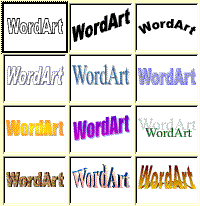VirtualMV/Multimedia/Elements/Text
| Multimedia Elements | ||
|---|---|---|
| Basics | Text | Graphics | Sound (Audio) | Animation | Video | | |
Multimedia text
Text is the most widely accessible content there is, and can be:
- magnified or read by special software or rendered by a braille reader
- loaded quickly
- viewed by nongraphical browsers
- read and indexed by search engines
- translated into other languages
- used as an alternative to multimedia content (e.g. caption images, audio, video)
Properties
Font
- Name: Times, Arial
- Style: Normal, Bold, Underline (used for hyperlinking on the web)
- Size: in points as a percentage of normal for the web
- color:
- effects: shadow, emboss, etc. (dependent on application)
If you use a variety of fonts when developing a multimedia application, you should consider if your Multimedia environment supports embedded fonts. This means target machines do not need fonts installed. Otherwise stick to standard fonts, and if you need special font effects you can use graphic (bitmapped) images of the text.
- Resources
Paragraph
- Alignment:Left,Center,Right,Justify
- Indentation (including first line )
- Line spacing
- Space before and after
- Widow and orphan control
- Hypenation (whether words are split).
Content
- Type: Original, Summarised, Copied
- Size: Example the number of words, pages etc.
- Value: The actual text
- Copyright information, including the source if necessary.
- Storyboard: Page/scene number
ASCII/UNICODE Formats
- Ascii text characters can be though of as the English symbols available on a European Keyboard.
- UniCode characters include those symbols needed by other languages
- ASCII files
- Commonly used to transfer raw text into multimedia presentations. In some products additional "control codes" are added to add emphasis.
- Hypertext Markup Language (HTML)
- ASCII text file that is enhanced to produce variations of font, style etc. The main format for internet based files.
- Rich Text Format (RTF)
- ASCII text file enabling formatted text to be transferred around different computing platforms. Initially designed to transfer files between the Apple Mac platform and the IBM PC platform.
- Also used as the source file for Windows Help files.
- Extensible Markup Language (XML)
- Not a replacement for HTML, it is designed to carry data not display it, tags are not predefined, it also needs to be self descriptive.--AdrianLim 17:19, 14 September 2011 (EDT)
Hypertext
- Hypertext is non-sequential.
- Each unit of information is a node (a sniplet!), that contain pointers to other nodes (links). A hypertext links connects an anchor node to a destination node. A backtrack facility allows the user to return to previous nodes.
- Presents several options to users, and the individual user determines the alternative at the time of reading.
Narrower definitions
- Frank Halasz from Xerox believes a true hypertext system should include an explicit representation of the network structure in its user interface.
- K. Eric Dexler advocates the use of bi-directional links, meaning any document linking to the page should be displayed.
Neilsen, Jakob (1995?) Multimedia and Hypertext. The Internet and Beyond. , SunSoft, Mountain View, California. AP Professional
Structures
- Hypertext information database with no structure and no central definition.
- Outliner
- Pre-defined heirarchical structure.
- Cannot have links in multiple sections, which is why not generally considered hypertext.
- Multi-window
- Eg. Hypercard and KMS.
- Allows user to view multiple windows on-screen.
Integration of technologies
Hypertext allows the integration of publishing, computing and broadcasting. Newspeek developed at MIT Media Lab, stores and classifies news. This repository can then be customised and delivered to individual users. If you watch 1 hour of news per night, you will spend more than 20,000 hours over your lifetime. If you save half that you have saved 2 years of your life! This ultimately means a newspaper/news broadcast customised to individual users.
Reference : Neilsen, Jakob (1995?) Multimedia and Hypertext. The Internet and Beyond. , SunSoft, Mountain View, California. AP Professional
If you watch 1 hour of news per night, you will spend more than 20,000 hours over your lifetime. If you save half that you have saved 2 years of your life!
Money saving benefits
The documentation for an F-18 fighter aircraft is 300,000 pages of printed text (or one CD-ROM). The CD-Rom is easily updated and copied.
Features
Basic features
- Text font, size
- In-line, in a scrolling text box, as an option in a drop box
Advanced features
This list gives an example of some advanced text features and is not a complete list. Please add any that you consider advanced using the annotation feature
- Formats (ASCII, RTF, HTML, XML)
- Text as a graphic
- Text as an animation (2D and 3D)
- Text to speech translation
- Speech to text conversion.
- Language translation
- Spell checking
- Legal issues
- Copyright (both on others and your original work)
- Privacy
- Fair use
- Package recommendation (when to use and what to use)
Benefits
- As a hyperlink easily linked.
- html standard features
- Usually underlined (this can be user customised either via a page tag or using cascading style sheets).
- Able to take on different colours to indicate scaffolding (Hyperlink, visited, active)
- Easy to modify to indicate site position.
- Can be used in a glossary link leading to a pop-up "spring-loaded" module.
Convey Details
Text is ideal for conveying details, whilst allowing for the imagination to fill in the gaps. It can describe a scene that is impossible, (though advanced animation techniques are making even the impossible possible - like walking through walls as in the Harry Potter movie- 2001) (Multimedia - What is it and how do we exploit it?, 1991) [2]
Accessibility
- For visually impared
- Can be used with screen readers
- Can be enlarged to easy readibility (must have percentage size settings)
Internationalisation
- Language converters can be used to change the language.
Customisability
Font styles and effects can be modified by
- setting properties
- the use of Cascading style sheets
Allow creation of interactive forms
- Data can be easily
- entered
- validated, e.g. Credit card entry
Compact size/Fast download
- Compared to video/graphic a lot of descriptive information can be conveyed without consuming vast amounts of disk space.
- So able to be downloaded quickly
Maintainability
- Easily entered and modified (via keyboard)
- No special skills (eg. digital scanning, video conversion)
Editibility
- Text can be copied to a Word processor and re-hashed/summarised easily.
Can be a graphic
- With text as a graphic, special effects can be achieved.
- For example
- You can use MS-Word Art to create the text, then copy [Ctrl]+[C]and paste [Ctrl]+[v]into a graphics program. This technique can be used to capture pretty well any graphic text displayed on your screen.
Can be displayed as an animation
Text can be animated, by creating it as a graphic. Obviously some text advantages disappear such as the ability to translate.
Reference : 3dtextmaker ( http://www.3dtextmaker.com) 2003
Hugh amounts available
- Large repositories already digitised
- Internet primarily textual
Distribution of print media
Newspapers can be distributed to a wide audience, and archived for research.
- New Zealand Herald ( http://www.nzherald.co.nz/ )
- Hawkes Bay Today ( http://www.mytown.co.nz/hawkesbay/ )
CD-ROM/DVD
CD Benefits
Benefits on CD-ROM are similar to those on the web. Where large graphics or video are required the text provides the hyperlinking to explain or describe the elements.
Creating and editing software
Examples
Text can be created in many applications;
- Basic text editing
- Windows notepad - an ASCII text editor
- Notepad++ , a free source code editor and Notepad replacement that supports several languages. Running in the MS Windows environment, its use is governed by GPL License.(NotePad++, n.d.)[3]
- Wordprocesssors (MS-Word, OpenOffice) and
- Web editors (Microsoft Expression Web, Adobe Dreamweaver).
Most authoring tools have the ability to enter text and apply a font(eg. Arial, Times) and style (eg. bold, italic).
In a web page text is created in a basic form and a Cascading Style sheet is used to apply the features.
Text can also be created as a graphic. This is important when for example a company requires a certain font to be used for its logo and it would not normally be expected to be available on a users computer.
 References
References
- ↑ Mayer, D (2010) “What Font Should I Use?”: Five Principles for Choosing and Using Typefaces. Retrieved March 25, 2011 from http://www.smashingmagazine.com/2010/12/14/what-font-should-i-use-five-principles-for-choosing-and-using-typefaces/
- ↑ Multimedia - What is it and how do we exploit it? (1991). People and Computers IV (Eds D.Diaper & N.Hammond), CUP:Cambridge
- ↑ Notepad++(n.d.). Retrieved August 2, 2009 from http://notepad-plus.sourceforge.net/uk/site.htm
|
virtualMV | Superquick wiki guide | Please give me some feedback |
VirtualMV/Multimedia/Elements/Text. (2024). In WikiEducator/VirtualMV wiki. Retrieved December 22, 2024, from http:https://wikieducator.org/VirtualMV/Multimedia/Elements/Text (zotero)
|


